Thomas James Richards, Diaries, Transcript Vol. 2 - Part 28
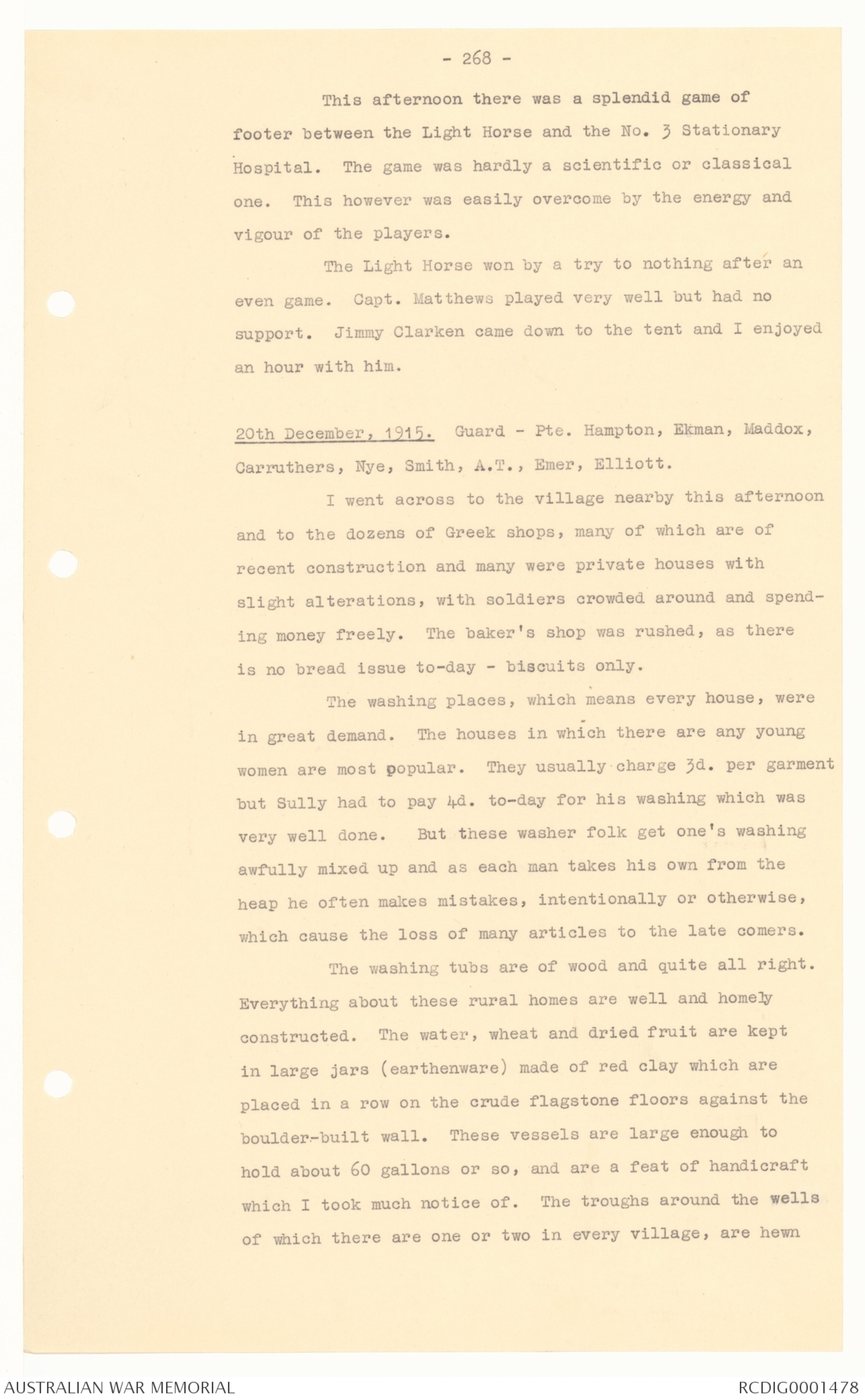
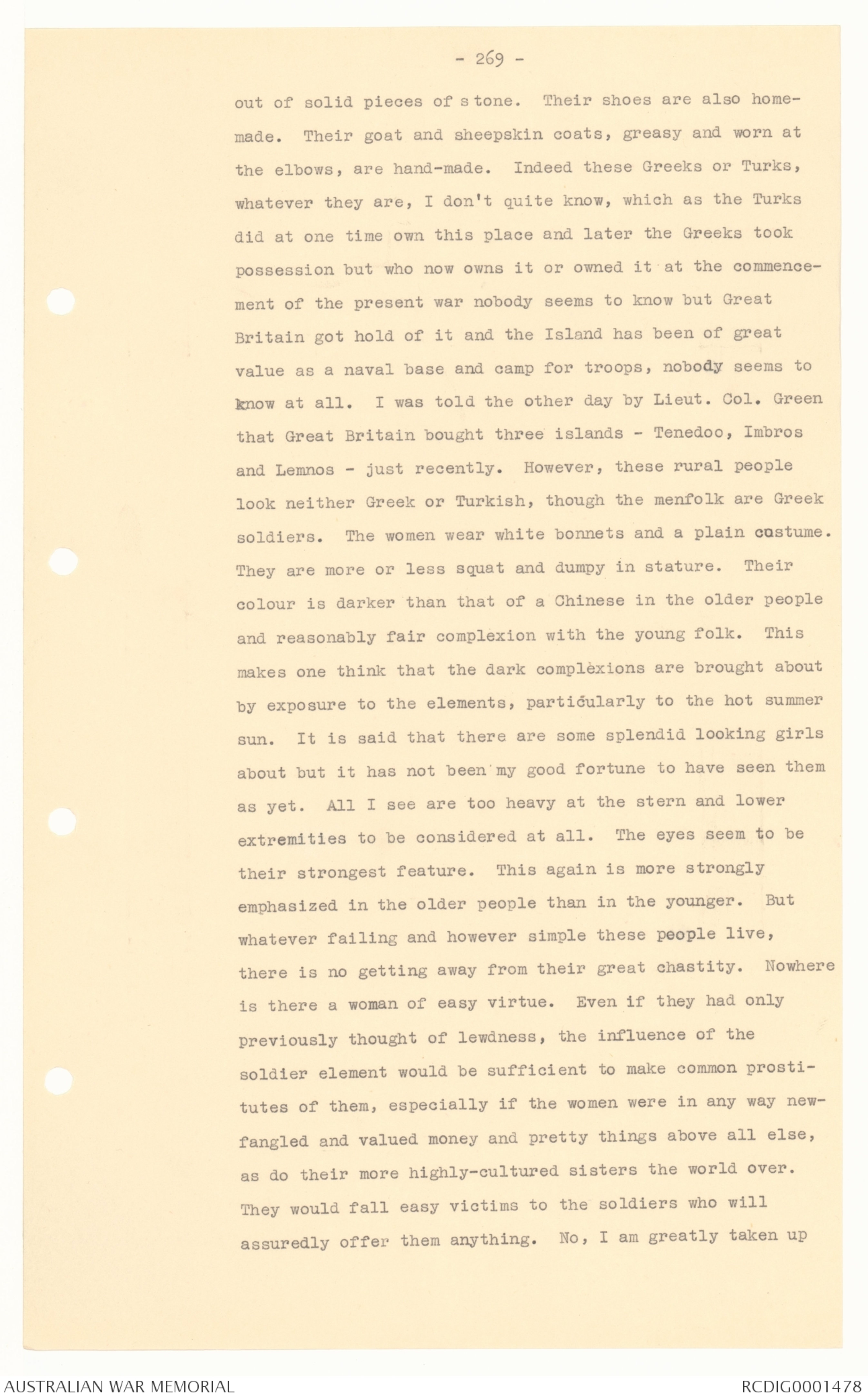
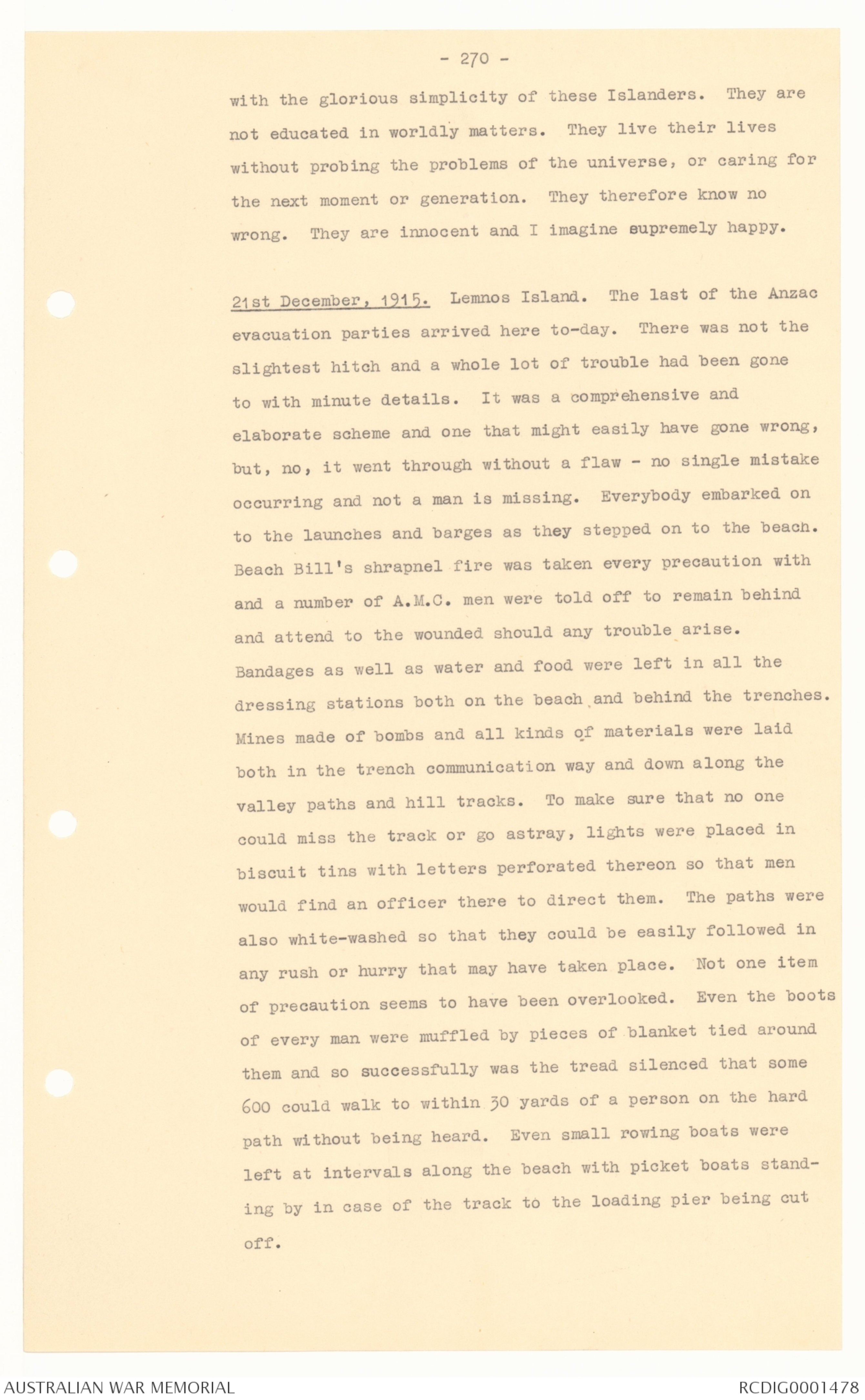
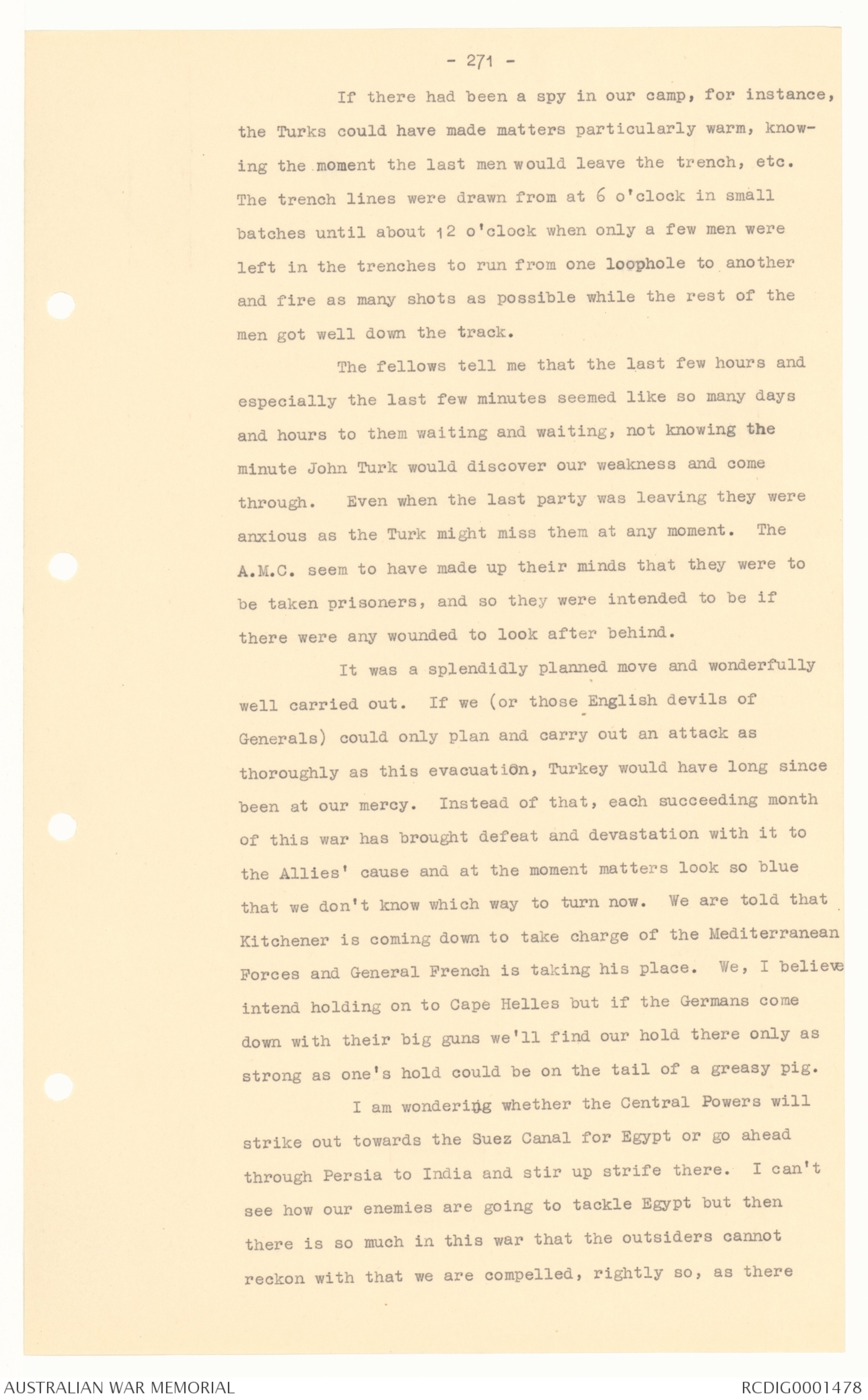
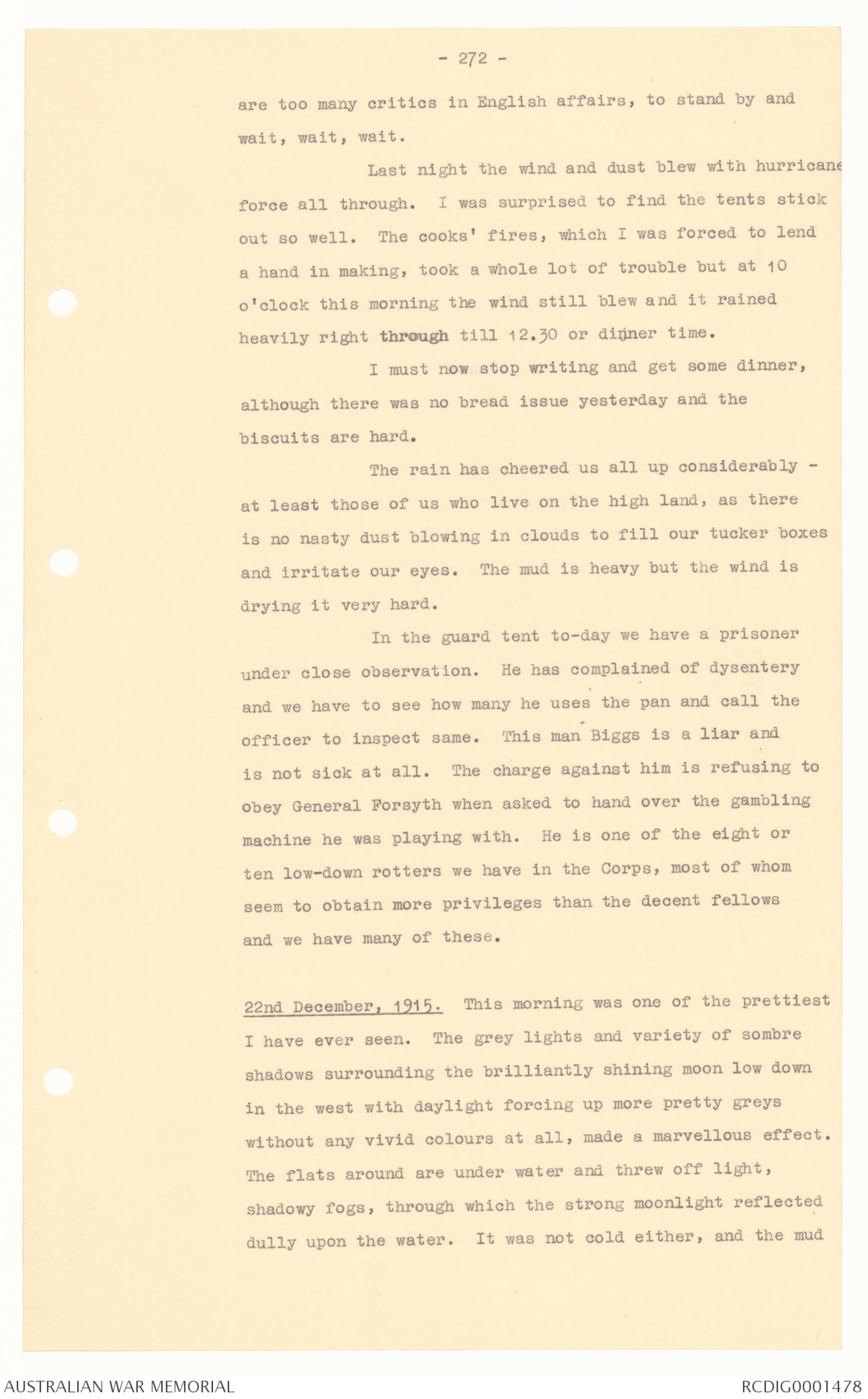
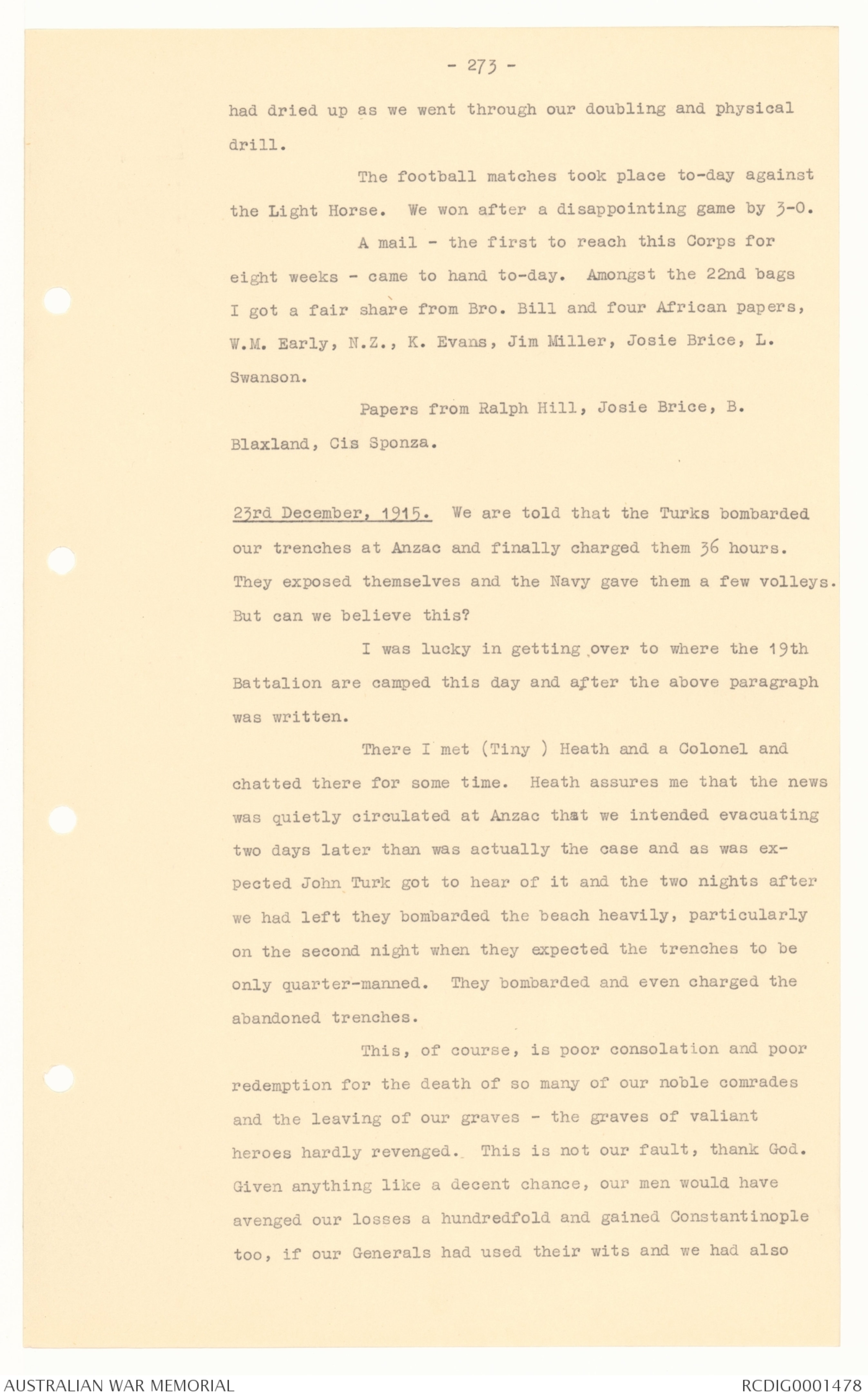
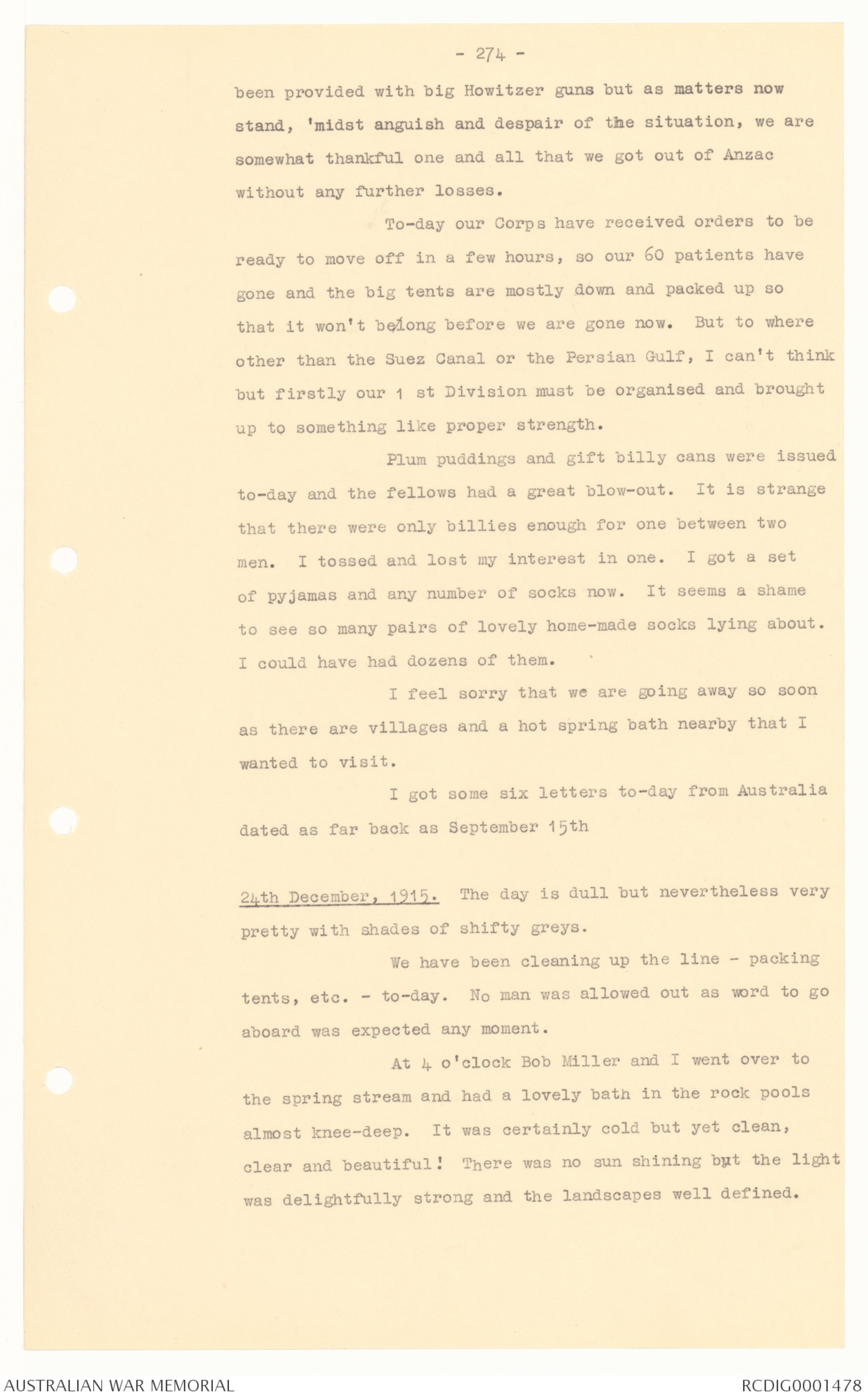
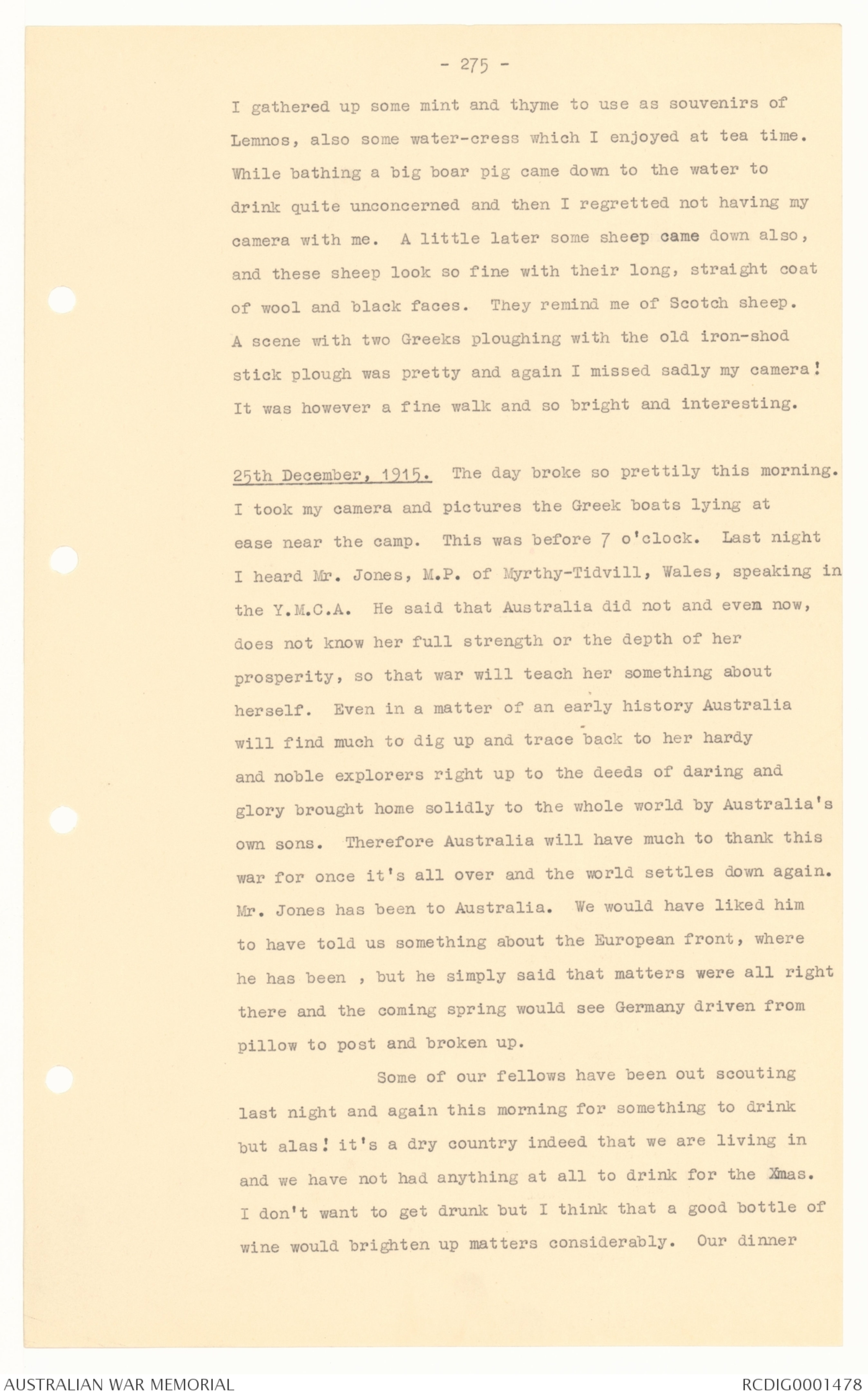
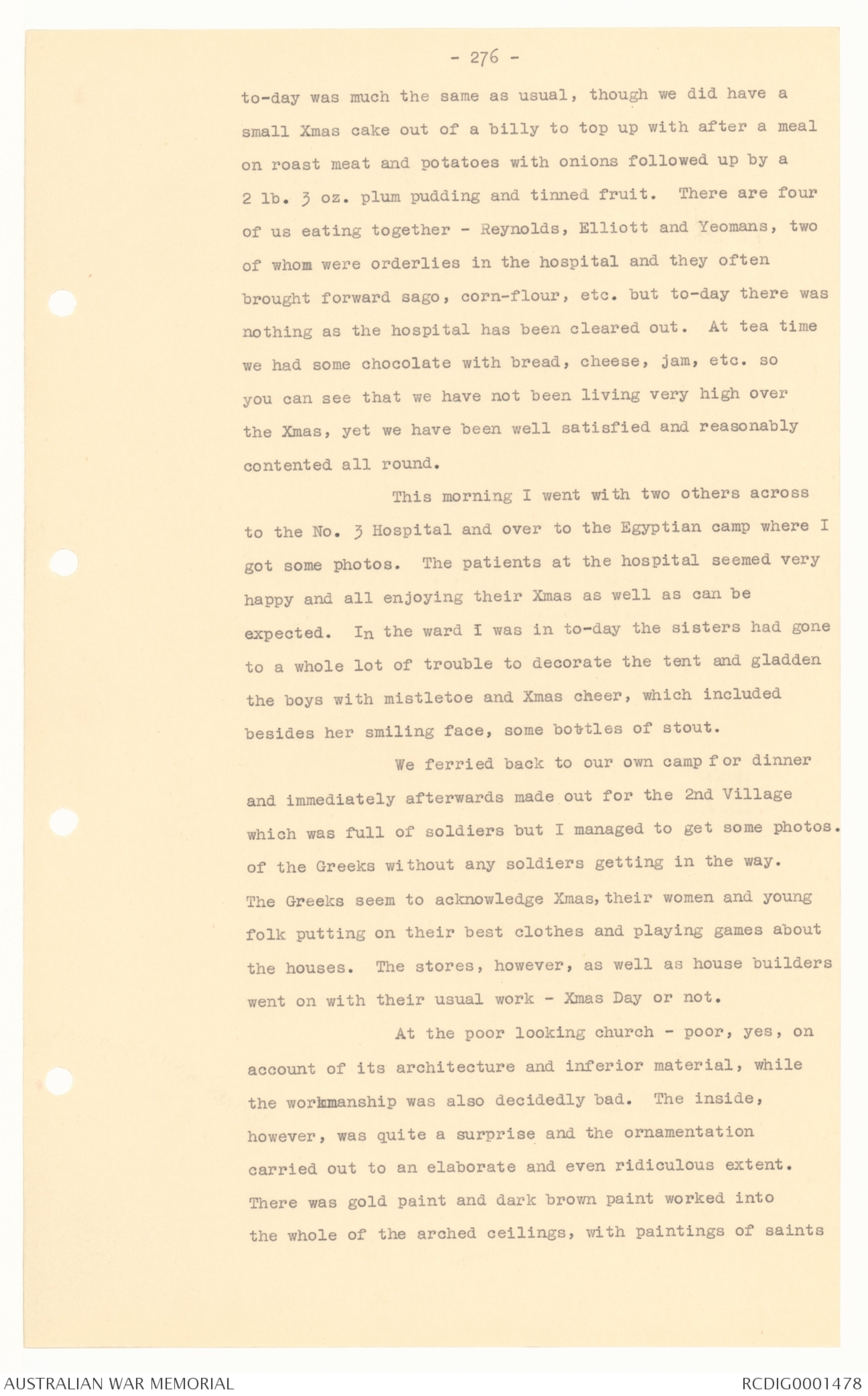
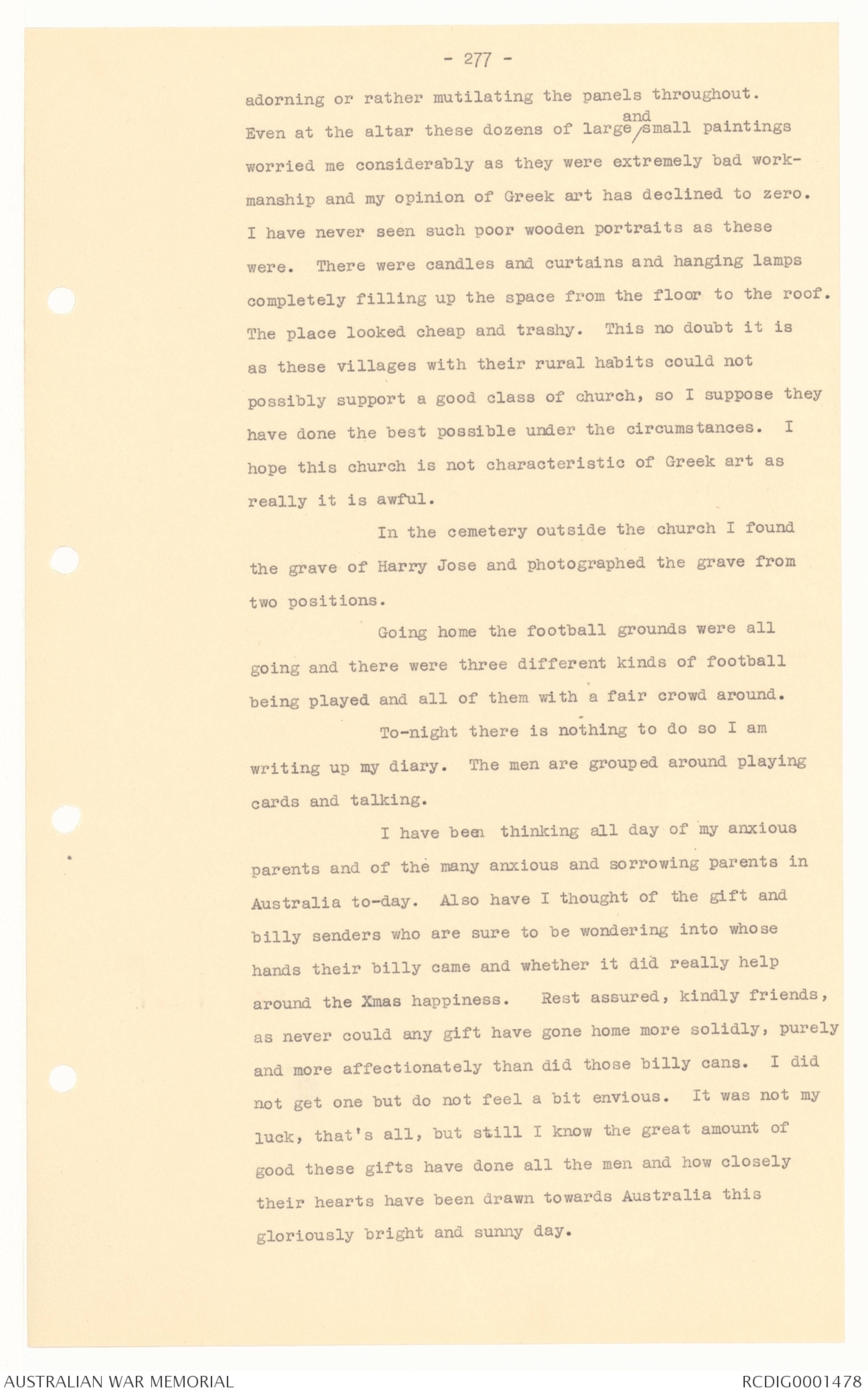
-268 -
This afternoon there was a splendid game of
footer between the Light Horse and the No. 3 Stationary
Hospital. The game was hardly a scientific or classical
one. This however was easily overcome by the energy and
vigour of the players.
The Light Horse won by a try to nothing after an
even game. Capt. Matthews played very well but had no
support. Jimmy Clarken came down to the tent and I enjoyed
an hour with him.
20th December, 1915. Guard - Pte. Hampton, Ekman, Maddox,
Carruthers, Nye, Smith, A.T., Emer, Elliott.
I went across to the village nearby this afternoon
and to the dozens of Greek shops, many of which are of
recent construction and many were private houses with
slight alterations, with soldiers crowded around and spending
money freely. The baker's shop was rushed, as there
is no bread issue to-day - biscuits only.
The washing places, which means every house, were
in great demand. The houses in which there are any young
women are most popular. They usually charge 3d. per garment
but Sully had to pay 4d. to-day for his washing which was
very well done. But these washer folk get one's washing
awfully mixed up and as each man takes his own from the
heap he often makes mistakes, intentionally or otherwise,
which cause the loss of many articles to the late comers.
The washing tubs are of wood and quite all right.
Everything about these rural homes are well and homely
constructed. The water, wheat and dried fruit are kept
in large jars (earthenware) made of red clay which are
placed in a row on the crude flagstone floors against the
boulder-built wall. These vessels are large enough to
hold about 60 gallons or so, and are a feat of handicraft
which I took much notice of. The troughs around the wells
of which there are one or two in every village, are hewn
-269-
out of solid pieces of stone. Their shoes are also home-made.
Their goat and sheepskin coats, greasy and worn at
the elbows, are hand-made. Indeed these Greeks or Turks,
whatever they are, I don't quite know, which as the Turks
did at one time own this place and later the Greeks took
possession but who now owns it or owned it at the commencement
of the present war nobody seems to know but Great
Britain got hold of it and the Island has been of great
value as a naval base and camp for troops, nobody seems to
know at all. I was told the other day by Lieut. Col. Green
that Great Britain bought three islands - Tenedoo, Imbros
and Lemnos - just recently. However, these rural people
look neither Greek or Turkish, though the menfolk are Greek
soldiers. The women wear white bonnets and a plain costume.
They are more or less squat and dumpy in stature. Their
colour is darker than that of a Chinese in the older people
and reasonably fair complexion with the young folk. This
makes one think that the dark complèxions are brought about
by exposure to the elements, particularly to the hot summer
sun. It is said that there are some splendid looking girls
about but it has not been my good fortune to have seen them
as yet. All I see are too heavy at the stern and lower
extremities to be considered at all. The eyes seem to be
their strongest feature. This again is more strongly
emphasized in the older people than in the younger. But
whatever failing and however simple these people live,
there is no getting away from their great chastity. Nowhere
is there a woman of easy virtue. Even if they had only
previously thought of lewdness, the influence of the
soldier element would be sufficient to make common prostitutes
of them, especially if the women were in any way new-fangled
and valued money and pretty things above all else,
as do their more highly-cultured sisters the world over.
They would fall easy victims to the soldiers who will
assuredly offer them anything. No, I am greatly taken up
-270 -
with the glorious simplicity of these Islanders. They are
not educated in worldly matters. They live their lives
without probing the problems of the universe, or caring for
the next moment or generation. They therefore know no
wrong. They are innocent and I imagine supremely happy.
21st December, 1915. Lemnos Island. The last of the Anzac
evacuation parties arrived here to-day. There was not the
slightest hitch and a whole lot of trouble had been gone
to with minute details. It was a comprehensive and
elaborate scheme and one that might easily have gone wrong,
but, no, it went through without a flaw - no single mistake
occurring and not a man is missing. Everybody embarked on
to the launches and barges as they stepped on to the beach.
Beach Bill's shrapnel fire was taken every precaution with
and a number of A.M.C. men were told off to remain behind
and attend to the wounded should any trouble arise.
Bandages as well as water and food were left in all the
dressing stations both on the beach and behind the trenches.
Mines made of bombs and all kinds of materials were laid
both in the trench communication way and down along the
valley paths and hill tracks. To make sure that no one
could miss the track or go astray, lights were placed in
biscuit tins with letters perforated thereon so that men
would find an officer there to direct them. The paths were
also white-washed so that they could be easily followed in
any rush or hurry that may have taken place. Not one item
of precaution seems to have been overlooked. Even the boots
of every man were muffled by pieces of blanket tied around
them and so successfully was the tread silenced that some
600 could walk to within 30 yards of a person on the hard
path without being heard. Even small rowing boats were
left at intervals along the beach with picket boats standing
by in case of the track to the loading pier being cut
off.
-271-
If there had been a spy in our camp, for instance,
the Turks could have made matters particularly warm, knowing
the moment the last men would leave the trench, etc.
The trench lines were drawn from at 6 o'clock in small
batches until about 12 o'clock when only a few men were
left in the trenches to run from one loophole to another
and fire as many shots as possible while the rest of the
men got well down the track.
The fellows tell me that the last few hours and
especially the last few minutes seemed like so many days
and hours to them waiting and waiting, not knowing the
minute John Turk would discover our weakness and come
through. Even when the last party was leaving they were
anxious as the Turk might miss them at any moment. The
A.M.C. seem to have made up their minds that they were to
be taken prisoners, and so they were intended to be if
there were any wounded to look after behind.
It was a splendidly planned move and wonderfully
well carried out. If we (or those English devils of
Generals) could only plan and carry out an attack as
thoroughly as this evacuation, Turkey would have long since
been at our mercy. Instead of that, each succeeding month
of this war has brought defeat and devastation with it to
the Allies' cause and at the moment matters look so blue
that we don't know which way to turn now. We are told that
Kitchener is coming down to take charge of the Mediterranean
Forces and General French is taking his place. We, I believe
intend holding on to Cape Helles but if the Germans come
down with their big guns we'll find our hold there only as
strong as one's hold could be on the tail of a greasy pig.
I am wondering whether the Central Powers will
strike out towards the Suez Canal for Egypt or go ahead
through Persia to India and stir up strife there. I can't
see how our enemies are going to tackle Egypt but then
there is so much in this war that the outsiders cannot
reckon with that we are compelled, rightly so, as there
- 272 -
are too many critics in English affairs, to stand by and
wait, wait, wait.
Last night the wind and dust blew with hurricane
force all through. I was surprised to find the tents stick
out so well. The cooks' fires, which I was forced to lend
a hand in making, took a whole lot of trouble but at 10
o'clock this morning the wind still blew and it rained
heavily right through till 12.30 or dinner time.
I must now stop writing and get some dinner,
although there was no bread issue yesterday and the
biscuits are hard.
The rain has cheered us all up considerably -
at least those of us who live on the high land, as there
is no nasty dust blowing in clouds to fill our tucker boxes
and irritate our eyes. The mud is heavy but the wind is
drying it very hard.
In the guard tent to-day we have a prisoner
under close observation. He has complained of dysentery
and we have to see how many he uses the pan and call the
officer to inspect same. This man Biggs is a liar and
is not sick at all. The charge against him is refusing to
obey General Forsyth when asked to hand over the gambling
machine he was playing with. He is one of the eight or
ten low-down rotters we have in the Corps, most of whom
seem to obtain more privileges than the decent fellows
and we have many of these.
22nd December, 1915. This morning was one of the prettiest
I have ever seen. The grey lights and variety of sombre
shadows surrounding the brilliantly shining moon low down
in the west with daylight forcing up more pretty greys
without any vivid colours at all, made a marvellous effect.
The flats around are under water and threw off light,
shadowy fogs, through which the strong moonlight reflected
dully upon the water. It was not cold either, and the mud
273
had dried up as we went through our doubling and physical
drill.
The football matches took place to-day against
the Light Horse. We won after a disappointing game by 3-0.
A mail - the first to reach this Corps for
eight weeks - came to hand to-day. Amongst the 22nd bags
I got a fair share from Bro. Bill and four African papers,
W.M. Early, N.Z., K. Evans, Jim Miller, Josie Brice, L.
Swanson.
Papers from Ralph Hill, Josie Brice, B.
Blaxland, Cis Sponza.
23rd December, 1915. We are told that the Turks bombarded
our trenches at Anzac and finally charged them 36 hours.
They exposed themselves and the Navy gave them a few volleys.
But can we believe this?
I was lucky in getting over to where the 19th
Battalion are camped this day and after the above paragraph
was written.
There I met (Tiny ) Heath and a Colonel and
chatted there for some time. Heath assures me that the news
was quietly circulated at Anzac that we intended evacuating
two days later than was actually the case and as was expected
John Turk got to hear of it and the two nights after
we had left they bombarded the beach heavily, particularly
on the second night when they expected the trenches to be
only quarter-manned. They bombarded and even charged the
abandoned trenches.
This, of course, is poor consolation and poor
redemption for the death of so many of our noble comrades
and the leaving of our graves - the graves of valiant
heroes hardly revenged. This is not our fault, thank God.
Given anything like a decent chance, our men would have
avenged our losses a hundredfold and gained Constantinople
too, if our Generals had used their wits and we had also
-274-
been provided with big Howitzer guns but as matters now
stand, 'midst anguish and despair of the situation, we are
somewhat thankful one and all that we got out of Anzac
without any further losses.
To-day our Corps have received orders to be
ready to move off in a few hours, so our 60 patients have
gone and the big tents are mostly down and packed up so
that it won't belong before we are gone now. But to where
other than the Suez Canal or the Persian Gulf, I can't think
but firstly our 1 st Division must be organised and brought
up to something like proper strength.
Plum puddings and gift billy cans were issued
to-day and the fellows had a great blow-out. It is strange
that there were only billies enough for one between two
men. I tossed and lost my interest in one. I got a set
of pyjamas and any number of socks now. It seems a shame
to see so many pairs of lovely home-made socks lying about.
I could have had dozens of them.
I feel sorry that we are going away so soon
as there are villages and a hot spring bath nearby that I
wanted to visit.
I got some six letters to-day from Australia
dated as far back as September 15th
24th December, 1915. The day is dull but nevertheless very
pretty with shades of shifty greys.
We have been cleaning up the line - packing
tents, etc. - to-day. No man was allowed out as word to go
aboard was expected any moment.
At 4 o'clock Bob Miller and I went over to
the spring stream and had a lovely bath in the rock pools
almost knee-deep. It was certainly cold but yet clean,
clear and beautiful! There was no sun shining but the light
was delightfully strong and the landscapes well defined.
-275 -
I gathered up some mint and thyme to use as souvenirs of
Lemnos, also some water-cress which I enjoyed at tea time.
While bathing a big boar pig came down to the water to
drink quite unconcerned and then I regretted not having my
camera with me. A little later some sheep came down also,
and these sheep look so fine with their long, straight coat
of wool and black faces. They remind me of Scotch sheep.
A scene with two Greeks ploughing with the old iron-shod
stick plough was pretty and again I missed sadly my camera!
It was however a fine walk and so bright and interesting.
25th December, 1915. The day broke so prettily this morning.
I took my camera and pictures the Greek boats lying at
ease near the camp. This was before 7 o'clock. Last night
I heard Mr. Jones, M.P. of Myrthy-Tidvill, Wales, speaking in
the Y.M.C.A. He said that Australia did not and even now,
does not know her full strength or the depth of her
prosperity, so that war will teach her something about
herself. Even in a matter of an early history Australia
will find much to dig up and trace back to her hardy
and noble explorers right up to the deeds of daring and
glory brought home solidly to the whole world by Australia's
own sons. Therefore Australia will have much to thank this
war for once it's all over and the world settles down again.
Mr. Jones has been to Australia. We would have liked him
to have told us something about the European front, where
he has been, but he simply said that matters were all right
there and the coming spring would see Germany driven from
pillow to post and broken up.
Some of our fellows have been out scouting
last night and again this morning for something to drink
but alas! it's a dry country indeed that we are living in
and we have not had anything at all to drink for the Xmas.
I don't want to get drunk but I think that a good bottle of
wine would brighten up matters considerably. Our dinner
-276-
to-day was much the same as usual, though we did have a
small Xmas cake out of a billy to top up with after a meal
on roast meat and potatoes with onions followed up by a
2 1b. 3 oz. plum pudding and tinned fruit. There are four
of us eating together - Reynolds, Elliott and Yeomans, two
of whom were orderlies in the hospital and they often
brought forward sago, corn-flour, etc. but to-day there was
nothing as the hospital has been cleared out. At tea time
we had some chocolate with bread, cheese, jam, etc. so
you can see that we have not been living very high over
the Xmas, yet we have been well satisfied and reasonably
contented all round.
This morning I went with two others across
to the No. 3 Hospital and over to the Egyptian camp where I
got some photos. The patients at the hospital seemed very
happy and all enjoying their Xmas as well as can be
expected. In the ward I was in to-day the sisters had gone
to a whole lot of trouble to decorate the tent and gladden
the boys with mistletoe and Xmas cheer, which included
besides her smiling face, some bottles of stout.
We ferried back to our own camp for dinner
and immediately afterwards made out for the 2nd Village
which was full of soldiers but I managed to get some photos.
of the Greeks without any soldiers getting in the way.
The Greeks seem to acknowledge Xmas, their women and young
folk putting on their best clothes and playing games about
the houses. The stores, however, as well as house builders
went on with their usual work - Xmas Day or not.
At the poor looking church - poor, yes, on
account of its architecture and inferior material, while
the workmanship was also decidedly bad. The inside,
however, was quite a surprise and the ornamentation
carried out to an elaborate and even ridiculous extent.
There was gold paint and dark brown paint worked into
the whole of the arched ceilings, with paintings of saints
-277-
adorning or rather mutilating the panels throughout.
Even at the altar these dozens of large^and small paintings
worried me considerably as they were extremely bad workmanship
and my opinion of Greek art has declined to zero.
I have never seen such poor wooden portraits as these
were. There were candles and curtains and hanging lamps
completely filling up the space from the floor to the roof.
The place looked cheap and trashy. This no doubt it is
as these villages with their rural habits could not
possibly support a good class of church, so I suppose they
have done the best possible under the circumstances. I
hope this church is not characteristic of Greek art as
really it is awful.
In the cemetery outside the church I found
the grave of Harry Jose and photographed the grave from
two positions.
Going home the football grounds were all
going and there were three different kinds of football
being played and all of them with a fair crowd around.
To-night there is nothing to do so I am
writing up my diary. The men are grouped around playing
cards and talking.
I have been thinking all day of my anxious
parents and of the many anxious and sorrowing parents in
Australia to-day. Also have I thought of the gift and
billy senders who are sure to be wondering into whose
hands their billy came and whether it did really help
around the Xmas happiness. Rest assured, kindly friends,
as never could any gift have gone home more solidly, purely
and more affectionately than did those billy cans. I did
not get one but do not feel a bit envious. It was not my
luck, that's all, but still I know the great amount of
good these gifts have done all the men and how closely
their hearts have been drawn towards Australia this
gloriously bright and sunny day.
 Not Yet Replaced By AI
Not Yet Replaced By AIThis transcription item is now locked to you for editing. To release the lock either Save your changes or Cancel.
This lock will be automatically released after 60 minutes of inactivity.